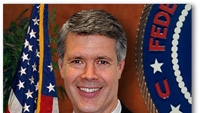McDowell says FCC is on ‘collision course’ with First Amendment over localism
The professional video industry's #1 source for news, trends and product and tech information. Sign up below.
You are now subscribed
Your newsletter sign-up was successful

FCC commissioner Robert McDowell has criticized what he called the FCC’s decision to start “dusting off decades-old policy regulations to impose on broadcasters.”
In an era of expanding new media, McDowell broke with his Democrat colleagues on the commission by asking “why are we considering placing these proverbial albatrosses around the necks of traditional media precisely at this ‘tipping point’ in history when they can least afford a regulatory disadvantage vis-a-vis unregulated platforms like the Internet?“
In November, the FCC adopted rules requiring TV broadcasters to report the content they air in various categories, including local news, civic programming, religious programming and independently produced programming. McDowell argued that this rule “raises the specter of several archaic regulations that the commission should not reinstate,” including the “ascertainment policy” under which stations had to maintain demographic profiles of their communities and consult with community groups and the public.
“The commission eliminated ascertainment requirements for television and radio stations in, ironically, 1984,” McDowell said, “after a thorough examination of the broadcast market, finding that ‘market incentives will ensure the presentation of programming that responds to community needs and provide sufficient incentives for licensees to become and remain aware of the needs and problems of their communities.’”
He continued, “If market incentives were sufficient in 1984 to motivate broadcasters to stay in touch with their communities, today's much more competitive market will certainly drive stations to respond to local interests.”
McDowell also questioned the need for the new Form 355 for television, which, he said, “foists upon local stations [the FCC’s] preferences regarding categories of programming.” He continued that “although the commission has not mandated certain types of programming, we are regulating with a wink and a nod by requiring lists of such programs. Why does the FCC need a list of the religious programming aired on a station? Why do we require a list of all local civic affairs programming? Why do we need to know whether it was locally produced or part of a regularly scheduled program? While we stop short of requiring certain content so far, we are headed on a collision course with the First Amendment rights of broadcasters.”
The professional video industry's #1 source for news, trends and product and tech information. Sign up below.
